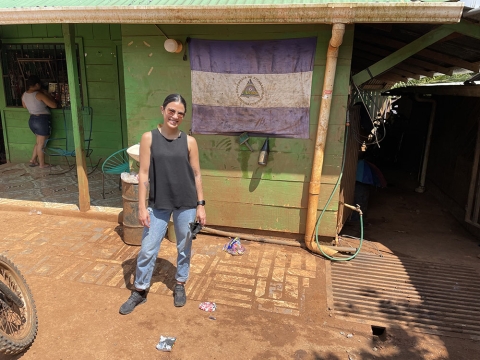
Para leer este artículo en inglés, presione aquí.
For journalist Cindy Regidor, it started with an observation.
Hundreds of thousands of her fellow citizens from Nicaragua were living abroad, with more fleeing every day. Regidor herself had left the country in 2015. Yet no Nicaraguan news outlets were covering immigration issues consistently or deeply.
“Sometimes there were reports – something very particular like an accident, somebody being killed abroad,” Regidor said. “But we weren’t seeing any of their stories, their lives, where they lived, what their struggles were, what they wanted, what the successes were, too.”
Regidor pitched her Nicaraguan news outlet, Confidencial, on a section devoted to covering the lives of migrants. Regidor wanted to tell the countless stories of people who have left their country. She recognized that this issue was much bigger than a headline. It deserved its own coverage and platform.
That’s when Nicas Migrantes was born. The section provides reporting on migration, featuring topics ranging from human interest stories to investigations as well as data and information on immigration in Costa Rica, a major destination for Nicaraguans.
Starting something new
Before the section launched in 2021, the International Center for Journalists (ICFJ) had selected Regidor for the Emerging Media Leaders program, a Professional Fellows Program funded by the U.S. State Department’s Bureau of Educational and Cultural Affairs. The program provides Latin American journalists with media training, the opportunity to work closely with U.S. newsrooms, and mentorship for a project. Regidor was, most recently, a fall 2022 recipient of the U.S. State Department's Alumni Impact Award for starting Nicas Migrantes.
The program training sessions as well as her media internship with ThinkProgress helped Regidor gain practical skills that she later used to enhance her management of Nicas Migrantes, she said. The fellowship prepared Regidor not only to pitch her editor and funders but also to lead Nicas Migrantes confidently and strategically.
“The fellowship came right at the moment where I was experiencing this traumatic event for my country and for myself, and I felt like I could do something about it,” said Regidor, referencing the 2018 protests that gained international attention for human rights violations from excessive use of force by pro-government groups.
A crackdown on free press
Nicaraguan journalists, activists and those perceived as opposing the Ortega regime continue to face many risks to their security and lives, including jail time and false criminal accusations. The reporters at Confidencial all currently work from exile. Most recently, CNN Español was cut from live broadcast television in Nicaragua.
“Since 2018, an estimated 200,000 Nicaraguans have fled the country avoiding the repression and persecution unleashed by one of the most violent regimes in the Western Hemisphere,” said Luis Botello, ICFJ deputy vice president of global impact and strategy. "At least 160 Nicaraguan journalists are exiled and many independent news organizations have been shut down or their newsrooms raided by the police.”
Since starting Nicas Migrantes, Regidor has not only continued to tell the diverse stories of migrants but also to grow the coverage.
“I think that we are demonstrating that we are not only surviving and enduring those attacks and reporting on that particular situation, but we are also growing and improving and evolving and we are still answering to the needs of our audience, and that includes the Nicaraguan migrants,” Regidor said.
Making an impact
During the COVID-19 pandemic in 2020, the team collaborated with several Costa Rican media outlets to report on cross-border communities. Their coverage revealed the effects of the Costa Rican border closure on these individuals and dispelled the false notion that Nicaraguan migrants were worsening COVID-19 in Costa Rica. They also reported on a femicide affecting the community, coverage that helped spur a congresswoman to advocate on behalf of the victim and her family.
“That was a small contribution to changing something in particular that was affecting these people’s lives,” Regidor said.
Together, the group won an award for this reporting series, signifying the strength of journalistic collaboration as well as storytelling through various mediums.
In 2021, Nicas Migrantes contributed to a study, led by the Inter-American Dialogue, on the lives of Nicaraguan migrants in Costa Rica. The research looked at assimilation, motives for migrating and more. For Regidor, the study was important to update and provide data to better understand the realities and stats on Nicaraguan migrants living and working in Costa Rica.
The content is uniting Nicaraguans both domestically and abroad. And more local media outlets have even begun reporting on Nicaraguan migration.
Within the last year, Nicas Migrantes reports user growth increased in Costa Rica (12%), the U.S. (9%) and Spain (8%) when comparing statistics from the first half of 2021 and the first half of 2022. These countries are also very representative to places where Nicaraguan migrants have fled.
Regidor wants Nicas Migrantes to continue growing and reaching more Nicaraguans. She recognizes the influence they have had and strives to continue providing a voice for migrants.
“We have this very big commitment [as journalists],” Regidor said. “I think the most important one is to fairly represent who we are and who we have been as [a] society as Nicaraguans.”
Image(s) courtesy of Cindy Regidor